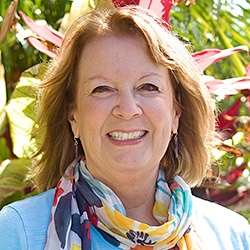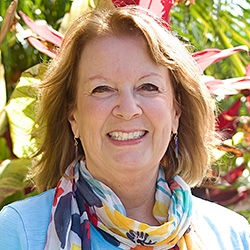

Search Results: responsibility
-
How DO we live our lives? What is an effective response to what is happening in the world? Listen in as Miki dialogs with a participant asking, "What is mine to do?", and honors the dissonance we feel when working to change.
-
Can you give me advice on what to do when people won't talk to me? I find it very difficult to discover what their needs are that aren't being met! Also, how can I be effective with people who don't actually want to think about why they're being the way they are?
-
- Discover what is yours to do in response to our global crises
- Weave nonviolence more deeply into how you live and lead
- Receive ongoing support in how to be effective and alive while pursuing your highest goals
- Increase your capacity to face and mourn current reality as a source of greater choice and energy
- Be a part of transforming the legacy of scarcity, separation, and powerlessness into a livable future
-
- Discover what is yours to do in response to our growing global crises
- Weave nonviolence more deeply into how you live and lead
- Receive ongoing support within and beyond the course in how to be effective and alive while doing what’s yours to do
- Increase your capacity to face and mourn current reality as a source of greater choice and energy
- Be a part of transforming the legacy of scarcity, separation, and powerlessness into a livable future
-
Anger and resentment can signal unmet needs. Through mourning those needs and practicing self-empathy, we may let go of blame, embrace reality, and reclaim responsibility for fulfilling our own needs. This process may lead to emotional transformation through conscious reflection, and a new outlook.
-
-
Codependency occurs when others' behavior affects us in unhealthy ways and we get obsessed with controlling their behavior. For example, we may focus on other's needs while neglect what matters to us, and resent it. Or we may depend on others to rescue us from results of our actions. Or we may fix or rescue others' neglected responsibilities. Or we may make others responsible for our needs. Instead, notice your needs, what you can('t) change, and your priorities.
-
Trainer Tip: On a scale of 1 to 10, how is your emotional bank account? If it’s lower than you like, consider what you can do right now to bring it closer to balance. Everyone in your life, and most especially you, will benefit from this. Even 15 mins of empathy may nourish you with accompaniment and perspective, even when the issues or circumstances in your life are the same.
-
- Explore what makes the capacity lens radical and practical
- Understand the complexities of how capacity and willingness interface
- Mourn capacity limits within and around us without jumping to conclusions
- Orient to agreements as behavioral anchoring in support of your commitments
-
In thinking about your relationship with fear and doubt, see what happens when you ask yourself "What do you trust?”. Here's an example response to that question, and how it can open new perspective, soften fear, and bring trust to new depths.
-
Control may help us feel safe in an unpredictable, unsafe, wild world. Wanting control may be a response to shielding ourselves from feeling fear and being aware of our vulnerability. The more we insulate from fear, discomfort, and vulnerability, the more we are cut off from aliveness; we can become more anxious, and depressed. The more we control the more we are disconnected from empathy and care. With aliveness come joy, peace, love, awe.
-
Trainer Tip: Next time someone asks how you're doing, you can check in with yourself and offer an honest answer. It doesn't need to be 15-minute response. You could say, "I’m feeling tired and overwhelmed by this project. I’m sure it'll work out. I’m just worried about it now. How are you?” If you're ready to do that, then you can be honest with yourself. Doing this can help you be present to how you are, and hold your experience as a gift to self and others.
-
When a person of color (A.K.A. a person from the Global Majority, or GM) tells a marginalization story that triggers a defensive response from a white participant in a group, to foster awareness and healing, leaders can address the white person's distress with empathy, highlighting the common dynamic of prioritizing white pain. From there, leaders can offer GM participants opportunity to share their experience and make requests of the group.
-
Strengthen empathy, goodwill, and authenticity at home, meeting life's challenges with grace.
-
Learn to recognize four forms of thinking and speaking that are likely to lead to disconnection.
-
- Do you know what is yours to do in response to our growing global crises?
- Is nonviolence woven as deeply as you want it into how you live and lead?
- Have you ever experienced what it’s like to participate in an interdependent web of mutual support to fully embody our commitments?
- Are you familiar with how to bring yourself back again and again to aligning with purpose in every moment?
- Do you see yourself as part of transforming the legacy of scarcity, separation, and powerlessness into a livable future?
-
Building your body and mind awareness can help you better regulate/calm your emotions. Regular self-empathy will help you better regulate your emotions as well as increase your body and mind awareness. If you are not aware of amygdala activation (fight/flight/freeze response), you will react instead of responding with choice. Use this eight-step process to develop your self-empathy/regulation skills.
-
It can be challenging to tell people that you don’t like a certain behaviour or action of theirs. Even with supportive intentions and compassionate language your message might be difficult for someone to receive. Of course, we are not responsible for others’ reactions, but we are responsible to care about each other, and there are effective ways to express ourselves with more care.
-
- Learn how every decision we make perpetuates the status quo or brings us closer to the vision of a world that works for all
- Find out about our big brain capacity to integrate needs, impacts, and resources to make decisions that work for everyone
- Understand why power differences interfere with collaborative decisions and what can be done about it
- Discover tools that support collaboration in larger groups and organizations— even across power differences!
-
What are the most powerful things I can do to build an inspired relationship? I answered the question with romantic relationships in mind; however, I believe the answer below applies to all important relationships.
Quick Links

Stay in Touch!
We value your privacy, won't share your email address and you can easily unsubscribe any time.
















